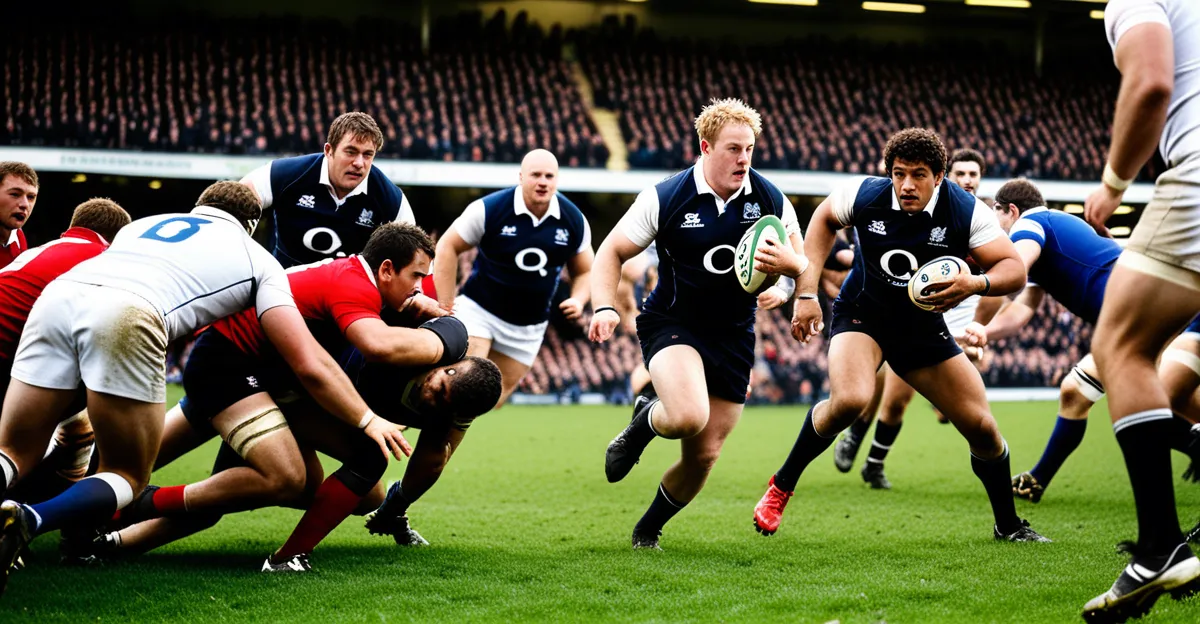Rugby’s Historical Roots in the UK
Rugby’s origin in the UK dates back to the early 19th century, emerging distinctly in England. The sport began at Rugby School in Warwickshire, where legend credits a pupil, William Webb Ellis, for picking up the ball and running with it during a football game. Though debated, this story marks the symbolic beginning of what would evolve into modern rugby. From these early beginnings, the game quickly spread beyond schools to clubs across the UK.
The development of rugby history reflects its transition from a localized school pastime to an organized national sport. By the mid-1800s, rugby clubs were being established in towns and cities throughout England, Scotland, Wales, and Ireland. This period saw the formal codification of rules and the establishment of governing bodies such as the Rugby Football Union in England in 1871, which was crucial in standardizing how rugby was played.
Also read : How can UK sports improve accessibility for disabled athletes?
Key milestones that cemented rugby’s legacy in the UK include the first international match between Scotland and England in 1871 and the growth of regional competitions. These events fostered a sense of competition and community, helping rugby entrench itself in the UK sport heritage. The sport’s spread to universities and working-class communities further broadened its appeal, making rugby a prominent fixture in British sporting culture.
Over time, rugby’s historical roots in the UK laid the foundation for it becoming much more than just a game. It evolved as a shared national tradition, embodying the social and cultural fabric of the UK.
In parallel : How Does Engaging in UK Sports Impact Community Bonds?
Rugby’s Role in Shaping National Identity
Understanding how rugby influences British identity and pride
Rugby and British identity have become deeply intertwined, reflecting much more than just a sport. It embodies a proud tradition that resonates with values integral to British culture: teamwork, respect, and resilience. These values are taught on fields across the UK, reinforcing a collective mindset where players learn cooperation and empathy, essential traits that echo beyond the pitch.
The cultural significance of rugby extends into how the sport represents national pride during international competitions. Events such as the Six Nations Championship showcase the competitive spirit and unity of the UK’s constituent nations. Fans rally not only behind their teams but also behind shared histories and identities, making rugby a living expression of British nationality.
Rugby also functions as a medium through which communities reaffirm their heritage and values. The sport’s emphasis on fair play and mutual respect mirrors societal aspirations, helping to bind diverse groups and generations. Through this lens, rugby is not only a game but a cultural force that helps shape and project British identity on the global stage.
Rugby in Communities and Schools
Grassroots rugby forms the backbone of the sport’s enduring popularity in the UK. By embedding rugby in schools across the UK, the game not only teaches physical skills but also nurtures essential life values such as teamwork and discipline. Rugby in schools UK programs have evolved to provide structured youth development pathways, ensuring young players gain access to quality coaching and opportunities to compete from an early age.
Local clubs serve as vital community hubs, linking generations and fostering a strong sense of belonging. These clubs support the growth of grassroots rugby by offering inclusive environments where players of all ages and abilities can participate. The community rugby culture thrives not just through match participation but also through social events and volunteerism, making the sport an integral part of local life.
Lifelong involvement in rugby is often inspired by early exposure within schools and communities. Many players and fans trace their passion back to these formative experiences in grassroots rugby settings. This generational connection enriches the sport’s cultural fabric and sustains its future, as communities continue to pass rugby traditions to younger members, strengthening the sport’s foundation across the UK.
Traditions, Major Events, and Iconic Rivalries
Signature customs, key tournaments, and enduring competitive drama
Rugby in the UK thrives through rich rugby traditions UK that elevate matchdays beyond mere games. From pre-match anthems to post-game celebrations, these rituals create a unique atmosphere cherished by players and fans alike. One of the most emblematic events is the Six Nations Championship, a pinnacle of international rugby showcasing fierce competition among England, Scotland, Wales, Ireland, France, and Italy. This tournament embodies national pride and the sport’s historical significance, drawing millions of supporters.
The Six Nations Championship stands out not only for its sporting excellence but also for its deep-rooted cultural resonance. Nations come together annually, renewing old rivalries and friendships. These contests often act as a showcase for the best UK talent, with matches steeped in history and passion. Alongside the Six Nations, domestic cups and regional tournaments add layers of excitement, maintaining rugby’s vibrant presence throughout the year.
Central to rugby’s allure are its rugby rivalries, some of which trace back over a century. Battles such as England vs. Scotland — the oldest international fixture — capture attention with historic significance and intense competition. These rivalries fuel spectator enthusiasm, heightening the stakes and celebrating the sport’s enduring spirit. Together, traditions, major events, and iconic rivalries form the backbone of UK rugby’s captivating narrative.
Rugby’s Cultural Symbolism and Achievements
Rugby holds a profound cultural impact in the UK, symbolizing both unity and diversity across its nations. The sport transcends boundaries, bringing together communities and individuals from varied backgrounds, united by shared passion and purpose. This inclusiveness makes rugby more than a game; it acts as a cultural bridge within the UK’s complex social fabric.
Key UK rugby symbols—from the iconic rose emblem of England to the dragon of Wales—represent not just teams but broader national identities, fostering pride and camaraderie. These symbols appear on jerseys and flags during matches, reminding fans of rugby’s deep roots in British heritage and the sport’s unifying power.
Rugby’s achievements echo loudly on both domestic and international stages. Celebrated players such as Jonny Wilkinson and Gareth Edwards exemplify excellence and have become legends whose careers inspire generations. Milestones like England’s 2003 Rugby World Cup victory highlight the sport’s global reach and competitive success, distinguishing rugby from other UK sports like football. Furthermore, rugby’s emphasis on respect, discipline, and sportsmanship enhances its cultural stature and underscores its distinct identity within the UK’s sporting landscape.
Collectively, these elements underscore rugby’s role in shaping British cultural identity, celebrating its past, and motivating future generations through shared values and remarkable accomplishments.











